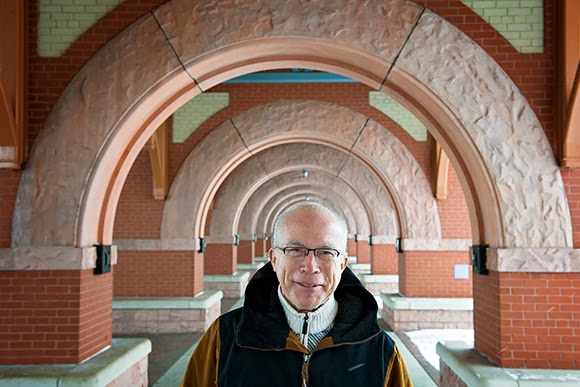Published by Southwest Michigan's Second Wave Media
January 30, 2014
 |
| Kalamazoo County Commissioner Jack Urban (Photo by Erik Holladay) |
A more efficient, more streamlined transit system in Kalamazoo, Michigan, with more routes and more frequent stops is the goal. Zinta Aistars has the report on how it's coming about.
 |
| Photo by Erik Holladay |
"When I spoke to representatives at Michigan Works, they told me one of the largest barriers unemployed people face is transportation," says Michele McGowen. McGowen is the chair of Friends of Transit for Kalamazoo County, an alliance of 49 organizations and individuals who advocate for a strong public transit system.
She's one of many who are cheering on the development of a regional transit system rather than one focused mostly on urban areas only. McGowen is part of a coalition working toward that end, and she also works for the Disability Network of Southwest Michigan. Part of what that organization does is to help the disabled negotiate public transportation.
"For years, people have thought of our transit system as buses that move around the city of Kalamazoo, but the transit system covers many municipalities. We need to revamp schedules and routes to reflect that," says McGowen. "And most of us live all over the county. For instance, I live outside of the city, but I work in the city. Yesterday I bought a pair of pants in Galesburg, and I stopped in still another town for coffee."
When we consider what kind of transit system we need, McGowen points out, we need to think past our own backyards.
In enthused agreement with her is Kalamazoo County Commissioner Jack Urban. He explains how the Kalamazoo County Transportation Authority (KCTA) is working to achieve metropolitan status, meaning more efficient, more streamlined, with more routes and more frequent stops.
Admittedly, Commissioner Urban says, it can be confusing. Two entities, city and county, are working toward a goal of merging into one regionalized, countywide transit system.
"The first step is to create a new authority to replace the city authority," he says. But mergers are never smooth or easy. A leadership team of elected and appointed officials are working to create a transition plan to a transit system that voters will embrace whether they live in or outside the city.
"State law requires millage to be uniform throughout the district," Urban says. "But people don't like that. That's why the millage vote in 2008 was defeated, because out on the perimeters voters aren't using it. People in the townships don't want to pay taxes for something they don't use. That's our first roadblock."
The other roadblock, Urban says, was ...
READ THE COMPLETE ARTICLE ON SECOND WAVE MEDIA.
No comments:
Post a Comment